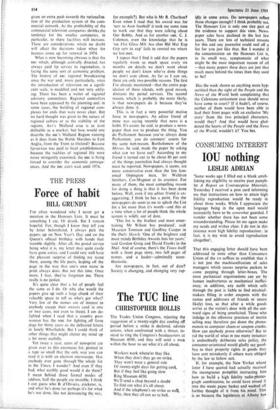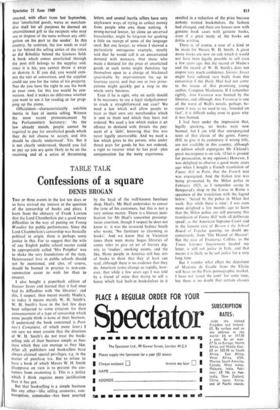IOU nothing
CONSUMING INTEREST LESLIE ADRIAN
`Some weeks ago I filled out a blank estab- lishing my eligibility to receive your pamph- let A Report on Contraceptive Materials. Yesterday I received a post card informing me that instructions on how to attain high fidelity reproduction would be ready in about three weeks. While I appreciate the language being in the open mail would necessarily have to be somewhat guarded, I wonder whether there has not been some misunderstanding. Please let me again make my needs and wishes clear. I do not in this instance want high fidelity reproduction: in fact, it is my wish to avoid reproduction altogether'.
That this engaging letter should have been addressed to none other than Consumers Union of the us suffices to establish that it is not just the machiavellianism of sales managers which causes surprise packets to come popping through letter-boxes. The most puritanical organisations can err by human inadvertence or mechanical ineffici- ency; in addition, any outfit which sells through the post is liable to find mischief- makers filling in order coupons with the names and addresses of friends or (more likely) foes, so that after a while goods arrive at the victim's door with all the out- ward signs of being unsolicited. Those who indulge in the offensive practices of inertia selling may therefore put down the pheno- menon to computer chaos or coupon cranks. How can anybody prove otherwise? But to rid the world of what in too many instances is undoubtedly deliberate sales policy, the consumer-orientated would gladly say good- bye to their property rights in goods they have sent mistakenly if others were obliged by the law to follow suit.
If, for example, the New Yorker whose letter I have quoted had actually received the incongruous pamphlet instructing him how to build a high fidelity radio-phono- graph combination, he could have tossed it into the waste paper basket and washed all further thought of it from his mind. This is so because the legislature at Albany has enacted, with effect from last September, that `unsolicited goods, wares or merchan- dise shall for all purposes be deemed an unconditional gift to the recipient who may use or dispose of the same without any obli- gation on his part to the sender'. In this country, by contrast, the law tends to trail as far behind the selling antics of the times as did Ribofilio behind the Guineas field. A book which comes unsolicited through the post still belongs to the supplier and, since it is his, you cannot throw it away or destroy it. If you did, you would com- mit the tort of conversion, and the supplier could sue you for the value of his property. Nor do you have the right to use the book as your own, for this too would be con- version. And it makes no difference whether you want to use it for reading or for prop- ping up the piano.
Officialdom—characteristically exhibits inertia in face of inertia selling. Witness the most recent pronouncement by the Parliamentary Secretary: 'As the law already stands, people cannot be required to pay for unsolicited goods which they do not choose to accept, and this should be clearly understood'. Yes. But it is not clearly understood. Should you fail to pay up you are quite likely to be on the receiving end of a series of threatening letters, and several inertia sellers have very unpleasant ways of trying to collect money from people who owe them nothing. A strong-nerved lawyer, let alone an unversed householder, might be forgiven for quaking a little on receipt of some of the language used. But one lawyer, to whom I showed a particularly outrageous example, stoutly said that he would call it an unwarranted demand with menaces, that those who made a demand for the price of unsolicited goods in such terms might therefore lay themselves open to a charge of blackmail (punishable by imprisonment for up to fourteen years), and that one or two prose- cutions might quickly put a stop to the whole sorry business.
Even if he is right, why on earth should it be necessary to use a legal sledgehammer to crack a straightforward nut case? We need a law which will allow people to treat as their own any merchandise which is sent to them and which they have not ordered. We need a law which makes it an offence to demand with threats the pay- ment of a 'debt', knowing that this was never legally recoverable. And we need a law which gives to the person, who under threat pays for goods he has not ordered, a right to recover what he has paid—plus compensation for the nasty experience.







































 Previous page
Previous page